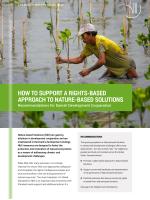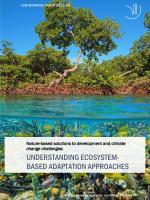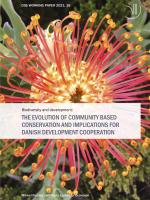How to support a rights-based approach to nature-based solutions
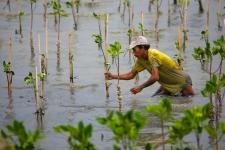
The growing emphasis on Nature-based Solutions to climate and development challenges offers many opportunities - but also involves risks - for indigenous peoples and local communities across the Global South.
Denmark should:
- Promote a rights-based approach to Nature based Solutions
- Support community leadership and representation in the governance of Nature-based Solutions
- Facilitate initiatives that secure community rights to benefit from Nature-based Solutions
See detailed recommendations further down.
While NbS offer many promises, it is critically important to ensure that such approaches safeguard and strengthen the rights of indigenous peoples and local communities in the use and governance of natural resources. The recent adoption of a Global Standard for NbS is an important step forward but the Standard needs support and additional actions if a rights-based approach is to be realized in practice. This policy brief provides recommendations for how Denmark can help ensure this.
The importance of rights in NbS
If operationalized to the fullest extent, NbS approaches have the potential to provide socially and environmentally sustainable ways to mutually address climate resilience, biodiversity conservation and human development. Ideally, the protection and restoration of natural ecosystems supports climate change adaptation and mitigation, halts biodiversity loss, and can enhance options for successful livelihoods.
However, deficient NbS initiatives may also pose risks for indigenous peoples and local communities if implemented only partially. This is especially true where nature protection interventions do not sufficiently consider pre-existing user rights to land, water and other resources, or exclude communities from decision-making and means of voicing their grievances.
The IUCN defines NbS as an approach designed to ‘protect, sustainably manage and restore natural and modified ecosystems that address societal challenges effectively and adaptively, simultaneously providing human well-being and biodiversity benefits.’
An example of NbS
In the Mountain Ecosystems Programme in Uganda, an NbS intervention integrated efforts on reforestation and agroforestry with green infrastructure and riverbank stabilisation, rainwater harvesting and alternative forms of income-generation. A number of environmental, economic and social benefits were reported, including fewer floods, increased species diversity and pollination, improved crop productivity and food security, and farming was reported as more resilient overall.
This can lead to so-called ‘green grabbing’ whereby communities lose access to land and natural resources that are key for their survival and resilience. Such situations often impact the poorest most and can lead to conflicts that cause conservation efforts to fail.
It is therefore critical to ensure that NbS measures do not undermine but rather sustain the rights of indigenous peoples and local communities to access, benefit from and govern natural resources. An emphasis on rights in NbS does not imply that communities can exploit protected species and ecosystems at will, but rather that conservation must be achieved by, with and for communities - thereby also enhancing the long-term success of conservation outcomes.
Global Standard for NbS
The IUCN Global Standard for NbS, adopted in 2020, includes explicit criteria and indicators on the inclusion and rights of indigenous peoples and local communities, without which an activity is not formally considered NbS.
The Global Standard is an important step forward but does not automatically mean that rights will be addressed in NbS. Firstly, adoption does not automatically lead to implementation. There is a risk that the Global NbS Standard is ignored in other global agreements or watered down as stakeholders rush to label activities “NbS”. Supporting actual uptake of the NbS standard by governments and other stakeholders is therefore key.
A range of rights issues may come into play in NbS. Among the most important are:
- Rights to access, own and benefit from land, water and other natural resources (substantive rights).
- Rights to take part in governing natural resources and access justice for redress (procedural rights).
These rights are directly or indirectly supported in international rights frameworks such as the Human Rights Declaration, the UN declaration on Rights of Indigenous Peoples, and regional frameworks such as the African Charter on Human and Peoples’ Rights.
Secondly, the Global Standard acknowledges the need for trade-offs between a variety of stakeholder interests in NbS. In such processes, indigenous peoples and local communities are not necessarily well equipped to defend and secure their rights. It is therefore necessary to support their ability to do so.
Recommendations
Denmark can play an important role in helping to ensure that NbS approaches avoid creating risks for indigenous peoples and local communities and instead support their rights, benefits and resilience.
Three features in particular must be addressed:
1. PROMOTE A RIGHTS-BASED APPROACH TO NATURE-BASED SOLUTIONS
NbS must be based on the principle that safeguarding and strengthening the rights of indigenous peoples and local communities is critical to all NbS efforts. Rights to access and benefit from land, water and other natural resources are particularly important. If this is not dealt with head-on, NbS will ultimately fail to deliver on development, resilience, and conservation objectives. Key actions include:
- Advance legal recognition and enforceable safeguards of rights-based approaches to NbS in global frameworks, including the finalisation and implementation of the Convention on Biological Diversity (CBD)’s post-2020 framework.
- Promote and implement the rights-related and pro-poor dimensions of the IUCN Global Standard for NbS (especially indicator 6.2 on rights to land and resources). This includes ensuring its application in Denmark’s own direct support to NbS and advocating for application (not just adoption) of these standards in project screening procedures of the Green Climate Fund (GCF), Global Environment Facility (GEF) and other funds supported by Denmark.
- Channel Denmark’s multilateral, bilateral and CSO support towards programmes and organisations that actively sustain and strengthen tenure and community land rights in NbS.
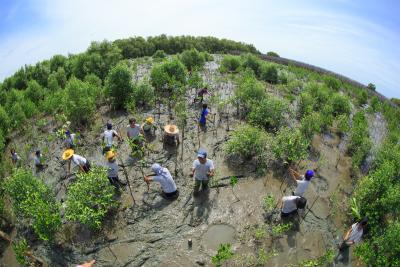
2. SUPPORT COMMUNITY LEADERSHIP AND REPRESENTATION IN NBS GOVERNANCE
A rights-based approach to NbS requires firm attention to governance, as also recognised in the IUCN Global Standard. Like all efforts to manage natural resources, the questions of who decides and who benefits are inevitably political. Support to NbS should therefore include measures that strengthen the position of indigenous peoples and local communities in the governance of NbS efforts. Key actions include:
- Anchor on-the ground NbS activities firmly in community- and local governance structures and allow for diversity in governance and management arrangements from site to site. Failure to do so can lead to mismatches and conflict with customary arrangements, as experience from efforts to scale up standardized community driven NbS shows.
- Support strong representation of indigenous peoples and local communities in the leadership of NbS initiatives and projects at not only local but also national and international levels. This could be done through work with associations such the ICCA Consortium (“Indigenous People’s & Community Conserved Territories and Areas”). As an example, the Inclusive Conservation Initiative currently being developed with GEF funding aims to support indigenous peoples’ and local communities’ leadership and influence in regional and international environmental policy processes.
- Support national institutional platforms through which indigenous peoples and local communities can defend and advocate for their rights to natural resources in NbS. This can include support to environmental grievance and conflict-resolution mechanisms, and to national associations of relevant CBOs and indigenous peoples’ organisations.
- Incorporate community rights to access, benefit from and govern natural resources as key indicators in NbS Monitoring and Evaluation and ensure that M&E schemes are participatory.
NbS approaches have the potential to provide socially and environmentally sustainable ways to mutually address climate resilience, biodiversity conservation and human development.
3. FACILITATE INITIATIVES THAT SECURE COMMUNITY RIGHTS TO BENEFIT FROM NBS
A rights-based approach to NbS ensures that communities enjoy a secure right to benefit from the economic gains that derive from resource conservation and use. This is by no means a given. Experience from community-based conservation shows that communities often end up receiving only a limited share of economic benefits, while the bulk of benefits remain with central governments and non-local private stakeholders. This is not only problematic from a development and resilience perspective, but also undermines support for the conservation component of NbS. Actions to address this include:
- Ensure that NbS initiatives build on and are firmly integrated with local economies and livelihood strategies, so that benefits are internalised in community resource use and -production. An example of this is locally led wetland management initiatives which enhance community fisheries and improve biodiversity, while also safeguarding community rights to wetland resources vis-à-vis external stakeholders. Such efforts carry fewer risks for communities than financial compensation- or revenue sharing arrangements and enhance the long-term economic basis for conservation in NbS.
- Support devolved financing and decentralisation for NbS. This can include facilitating policies and programmes that improve local government control of public budgets related to natural resources and environment; “making the case” for rights-based NbS by documenting their efficiency and low costs vis-à-vis central governments; and working to enhance subnational access to global climate and environment funds.
- When leveraging funds, Denmark could play a role in ensuring that private sector financing of NbS initiatives adheres to a right-based approach and follows e.g. the principles of the IUCN Governance Framework and the NbS standard. In so doing, Denmark could team up with African partner countries and key multilateral and bilateral donors who have been active in NbS, such as GiZ, UK, UNEP/UNDP and WWF to jointly leverage financial support and commit to a rights-based NbS approach.
This DIIS Policy Brief has received financial support from the Ministry of Foreign Affairs of Denmark. It reflects the views of the authors alone.
DIIS Eksperter


